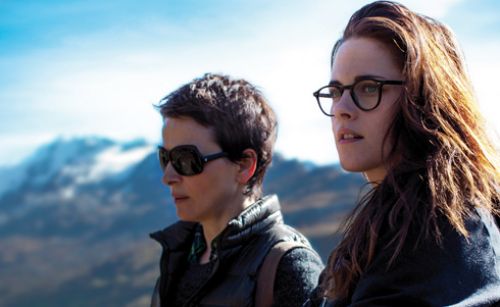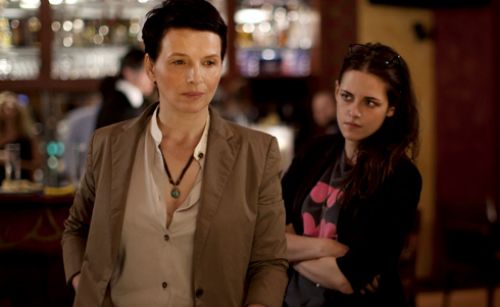Clouds of Sils Maria is a film 30 years in the making. Olivier Assayas and Juliette Binoche – its writer-director and star – first met while working on Rendez-Vous, Olivier's earliest writing credit. Rendez-Vous was a breakthrough for both of them: the film turned Juliette into one of the biggest movie stars in Europe, while Olivier was able to transition from screenwriting into a successful directing career.
Three decades later, Juliette approached Olivier about working together again, pitching a loose idea about three women in different phases of their careers. A character study of someone reluctantly moving into a new chapter of their life, Clouds of Sils Maria draws on their shared history: the actress plays Maria Enders, a decidedly Juliette Binoche-like star who faces a crisis after agreeing to appear in a restaging of the two-hander play that made her famous, except now playing the older woman rather than the ingénue. Ahead of its release we spoke to Olivier about making the film.

Superficially at least, there are clear similarities between Juliette Binoche and the character she plays. Did you try to differentiate between the two, or was that tension interesting?
Juliette and I are friends but we're not that familiar or intimate – I've never known what her everyday life is like. I know her but I also fantasise her. I imagine things about her. Some of them are true, some are totally off the mark. So when I'm writing a character like Maria Enders I know that I'm playing with my own assumptions as well as the assumptions of the audience, the way the audience imagines her. I'm playing on this border between fiction and reality. I'm also opening a space for Juliette because it's something she had never really done before, playing someone who's similar to her. She could have fun simultaneously being herself and the actress she might have been.
The film depicts the logistical side of being a movie star. Did you feel an obligation to show that world as you've experienced it or could you be speculative about that also?
I describe it more or less as it is, the business side of it. When you're a movie star you become a cottage industry, selling yourself. You have to continually respond to offers to accept or turn them down. You have to attend functions, film festivals, for which they provide the hairdresser, the make-up, the Chanel dress, and you have to look glamorous. You're a movie star for a few hours and then you go back to your everyday life, which is mostly about hard work. Maria is struggling with a role that questions her own essence and identity, but sometimes you could be in a plain bad film where you have to try to find a way of lifting it up, or at least surviving it.
Clouds of Sils Maria asserts the idea of the primacy of the actor, where a shining performance is almost something above the actual text. Did that come from a natural sympathy for the character, or is that that how you feel about acting?
What I wanted to express first is how tough it is to be an actor and the sympathy I have for them. Their job is ultimately about understanding fellow humans. They have to find within themselves the path to those emotions, to experience them if only to understand what's going on. It's not a path towards artificiality, it's a path towards the very texture of human nature, and that's something actors are left alone with. When you're a writer you try to invent complex characters but you're on both sides. You're doing the questions and the answers. When you're an actor you deal with the reality of specific emotions. You have to transform what the writer has devised into truth.

Throughout the film Maria debates modern film-making and superhero movies with her assistant Valentine, played by Kristen Stewart. Does either character represent your thoughts on the subject, or were you showing the viewpoints these characters might have?
I have to agree with both of them because their conflict is not really a conflict. It's a difference of perspective. It's the take on those movies from two women of different generations – one who is a curious viewer and one who is in touch with that culture because it's her generation and she's never really questioned it. The film doesn't really embody my views on blockbuster film-making but instead my view on the passing of time. What happens when time passes is not that you lose touch with the world but that your experience it is different from someone twenty years younger than you. In terms of blockbusters I'm really on both sides too. I can enjoy watching them even if I'm usually slightly disappointed because they're very repetitive. I certainly don't look down on them. At the same time I can see that they are a manifestation of our obsession with teenage culture.
The relationship between real life and the film is also raised with your inclusion of Chloë Grace Moretz's character Jo-Ann, a young movie star hounded by paparazzi. Did that enter into your consideration when casting Kristen Stewart, an actress who has lived that experience?
Kristen could have been either character and she by far preferred to be Valentine. It gave her this oblique angle on celebrity culture – there was this shift of perspective which freed her in a certain way. It's a film where you never lose sight of who's playing what. In most movies you try to forget that the actor is playing a character. Here that's part of the film. You are constantly seeing Juliette, Kristen and Chloë in addition to seeing Maria, Valentine and Jo-Ann. It's the opposite of when the Dardenne brothers made Two Days, One Night, where the whole point is about trying to forget that movie star Marion Cotillard is playing a factory worker in Belgium. What actors do is try to reinvent themselves, to make it feel like they've been always that character and nothing else, to become one. Here I didn't want them to do that. I didn't want them to become one. I was happy with them staying two.

